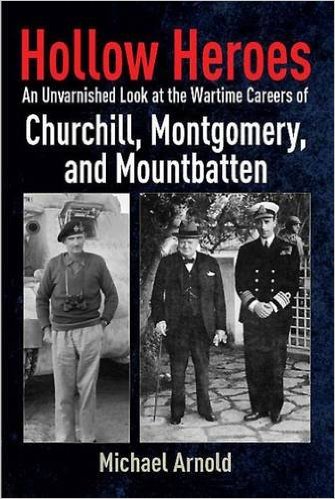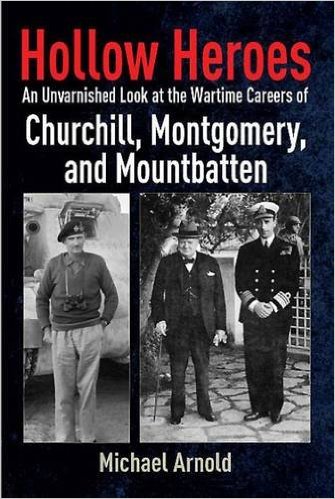
Finest Hour 171
Books, Arts & Curiosities – Hollow Book

March 20, 2016
Finest Hour 171, Winter 2016
Page 44
Review by Nigel Hamilton
Michael Arnold, Hollow Heroes: An Unvarnished Look at the Wartime Careers of Churchill, Montgomery, and Mountbatten, Casemate, 2015, 304 pages, $34.95.
ISBN 978-1612002736
 There are as many biographies as there are biographers: some serious, some not. Plus others that purport to be serious, but are not. Into which category does Michael Arnold’s Hollow Heroes fall?
There are as many biographies as there are biographers: some serious, some not. Plus others that purport to be serious, but are not. Into which category does Michael Arnold’s Hollow Heroes fall?
A former insurance salesman, Mr. Arnold has a passion for polemic. His first book, The Bodyline Hypocrisy, was a book of conversations (with Harold Larwood) about the great cricket conundrum: should bowlers be allowed to bowl straight at the batsman to intimidate him, as in the famous 1932–33 Ashes tour between England and Australia?
After this, Mr. Arnold plunged into another form of polemic: military history. His work when published was titled Sacrifice of Singapore: Churchill’s Biggest Blunder. According to the publisher’s blurb: “when, inevitably, Singapore fell to the Japanese in February 1942, Churchill attempted to deflect criticism by accusing the defenders there of spineless capitulation. Recently released information from the Office of Naval Intelligence in Washington reveals that United States President Franklin Roosevelt not only knew of the impending attack on Pearl Harbour but actually instigated it. Although Roosevelt promised a shield of B-17 aircraft for Singapore from Manila, General Douglas MacArthur in the Philippines had been told to do nothing until after the Japanese attacks there and at Pearl Harbor so that the United States could claim an unprovoked assault that would allow them to declare war on Japan.”
FDR instigated the Japanese attack on Pearl Harbor? MacArthur was ordered not to use his B-17s? Clearly, Mr. Arnold—a proud amateur—was keen to join the ranks of skeptics who cry “murder most foul” behind major historical events: a potentially lucrative book market. Without having to train or study as an historian, Arnold could thus use his salesman’s talents to prey on readers’ interest in history, and sell his own patent medicine, or charm.

2024 International Churchill Conference
Complete indifference seems to have greeted this first attempt. So from Malayan climes Arnold, who lives in Australia, moved on to challenge yet more “great” names—this time tying Field Marshal Montgomery and Admiral Mountbatten to poor Winston Churchill’s blunders, in the hope of increased sales.
Hollow Heroes is the result. Though it cannot be taken seriously as history or biography—since it amounts to a tedious mishmash of selected quotes and arguments plagiarized from previous critics of Churchill, Montgomery, and Mountbatten—this is to my mind a pity. “Great” men and women cannot be given a free pass in an open society—indeed critical biography may rightly be seen as the sine qua non of a free and open society. To subject “great” figures of the Second World War to historical and biographical analysis and revision is thus a worthy undertaking— and Churchill, Montgomery, and Mountbatten expected to be criticized, even damned, in their lifetimes, as well as by posterity. “The rats will get at me!” Monty used to say to me, when I knew him as a student. The Field Marshal even invited his severest critic, Correlli Barnett, to his watermill home in Hampshire in retirement to answer questions Barnett might have. It did not help, in terms of reputation: Barnett announcing on BBC radio on the morning of Montgomery’s death that he was a most overrated general.
Churchill, too, was open to insult and criticism—in fact revelled in the battle of wits it provoked: knowing that his own wit matched, in fact probably exceeded, that of any man (or woman) alive. Mountbatten also was aware from the beginning of the war that he would be the butt of resentment, given his age and inexperience. It did not inhibit him or his ambition, however, and after the war he bravely dared speak and travel in Canada, where he had never been forgiven for his ill-fated Dieppe fiasco.
All three men, then, accepted that genuine biographers would not necessarily be kind to them. Quite what might they have made of a work that, in its conclusion, finds Churchill’s faults as “huge” as his achievements, and that “Montgomery was little more than a vastly overrated opportunist and Mountbatten was a megalomaniac whose massive mistakes and excesses were excused because of connections with the monarchy,” is anybody’s guess. But one thing is certain: Mr. Arnold’s preferred heroes would have made all of them laugh aloud.
Arnold’s own “great” men of the Second World War are, instead, “the unsung heroes, [Generals] Wavell and Auchinleck, and the hidden hero, Dorman-Smith”—the last one having served as General Auchinleck’s chief of staff in North Africa, and having been (rightly, in my mind) fired by Churchill on the Prime Minister’s famous trip to Egypt in the summer of 1942.
In other words, to criticize “great” men is one thing—indeed it is part and parcel of our democratic way of life. The efforts of serious, critical historians and biographers who base their work on real work they undertake in archives and by interviews they conduct deserve to be read carefully, and their arguments tested against the evidence they provide: which is what happens, by and large, in our society. But for Mr. Arnold—as a former insurance salesman, and with no attempt to be critical, or do any serious historical investigation of his own to examine his own alternative heroes—to claim that Generals Wavell, Auchinleck, and Brigadier Dorman-Smith—three men who each failed in their military roles in the Second World War and were dismissed, or moved to other posts in 1941 and 1942—were the real heroes of that war, is simple, unsubstantiated quackery, based on the claims of other authors. If it is not too late, I can only urge Mr. Arnold to take a late-life graduate course in history and biography before he indulges himself and us in more amateur, plagiaristic polemics.
Nigel Hamilton is the author of The Mantle of Command: FDR at War, 1941–1942. His new book, Commander in Chief: FDR’s Battle with Churchill, 1943, will be published in June 2016.
Subscribe
WANT MORE?
Get the Churchill Bulletin delivered to your inbox once a month.


